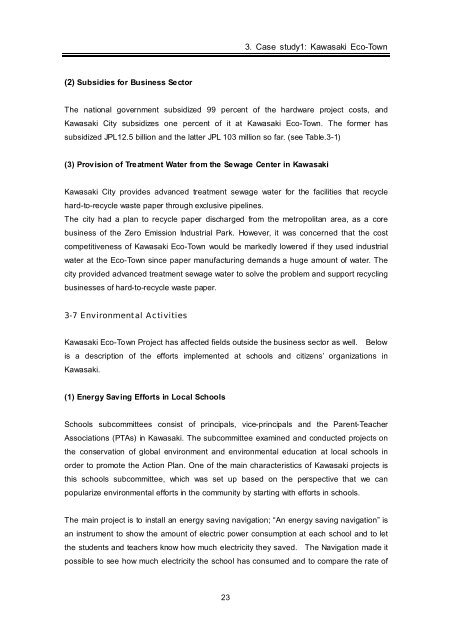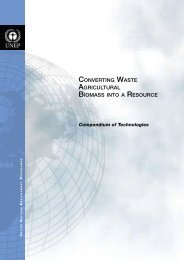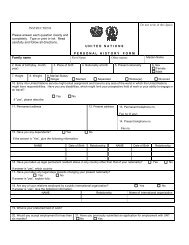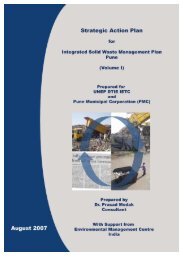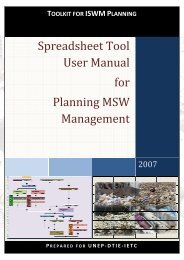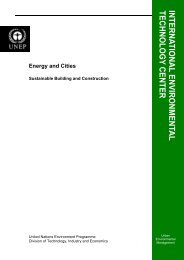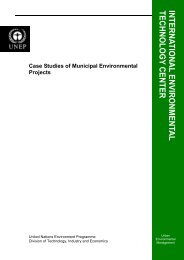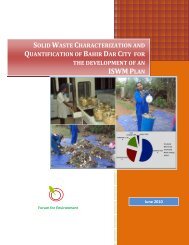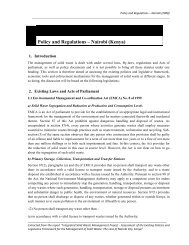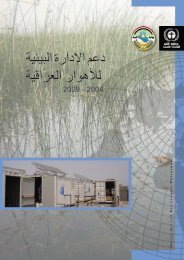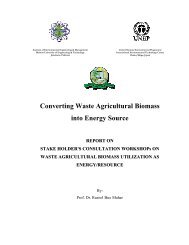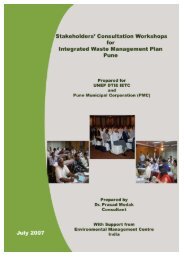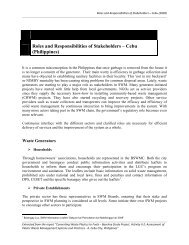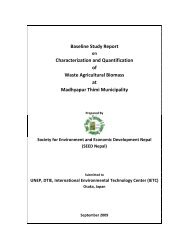Research on Eco-Towns in Japan - UNEP
Research on Eco-Towns in Japan - UNEP
Research on Eco-Towns in Japan - UNEP
You also want an ePaper? Increase the reach of your titles
YUMPU automatically turns print PDFs into web optimized ePapers that Google loves.
3. Case study1: Kawasaki <strong>Eco</strong>-Town<br />
(2) Subsidies for Bus<strong>in</strong>ess Sector<br />
The nati<strong>on</strong>al government subsidized 99 percent of the hardware project costs, and<br />
Kawasaki City subsidizes <strong>on</strong>e percent of it at Kawasaki <strong>Eco</strong>-Town. The former has<br />
subsidized JPL12.5 billi<strong>on</strong> and the latter JPL 103 milli<strong>on</strong> so far. (see Table.3-1)<br />
(3) Provisi<strong>on</strong> of Treatment Water from the Sewage Center <strong>in</strong> Kawasaki<br />
Kawasaki City provides advanced treatment sewage water for the facilities that recycle<br />
hard-to-recycle waste paper through exclusive pipel<strong>in</strong>es.<br />
The city had a plan to recycle paper discharged from the metropolitan area, as a core<br />
bus<strong>in</strong>ess of the Zero Emissi<strong>on</strong> Industrial Park. However, it was c<strong>on</strong>cerned that the cost<br />
competitiveness of Kawasaki <strong>Eco</strong>-Town would be markedly lowered if they used <strong>in</strong>dustrial<br />
water at the <strong>Eco</strong>-Town s<strong>in</strong>ce paper manufactur<strong>in</strong>g demands a huge amount of water. The<br />
city provided advanced treatment sewage water to solve the problem and support recycl<strong>in</strong>g<br />
bus<strong>in</strong>esses of hard-to-recycle waste paper.<br />
3-7 Envir<strong>on</strong>mental Activities<br />
Kawasaki <strong>Eco</strong>-Town Project has affected fields outside the bus<strong>in</strong>ess sector as well. Below<br />
is a descripti<strong>on</strong> of the efforts implemented at schools and citizens’ organizati<strong>on</strong>s <strong>in</strong><br />
Kawasaki.<br />
(1) Energy Sav<strong>in</strong>g Efforts <strong>in</strong> Local Schools<br />
Schools subcommittees c<strong>on</strong>sist of pr<strong>in</strong>cipals, vice-pr<strong>in</strong>cipals and the Parent-Teacher<br />
Associati<strong>on</strong>s (PTAs) <strong>in</strong> Kawasaki. The subcommittee exam<strong>in</strong>ed and c<strong>on</strong>ducted projects <strong>on</strong><br />
the c<strong>on</strong>servati<strong>on</strong> of global envir<strong>on</strong>ment and envir<strong>on</strong>mental educati<strong>on</strong> at local schools <strong>in</strong><br />
order to promote the Acti<strong>on</strong> Plan. One of the ma<strong>in</strong> characteristics of Kawasaki projects is<br />
this schools subcommittee, which was set up based <strong>on</strong> the perspective that we can<br />
popularize envir<strong>on</strong>mental efforts <strong>in</strong> the community by start<strong>in</strong>g with efforts <strong>in</strong> schools.<br />
The ma<strong>in</strong> project is to <strong>in</strong>stall an energy sav<strong>in</strong>g navigati<strong>on</strong>; “An energy sav<strong>in</strong>g navigati<strong>on</strong>” is<br />
an <strong>in</strong>strument to show the amount of electric power c<strong>on</strong>sumpti<strong>on</strong> at each school and to let<br />
the students and teachers know how much electricity they saved. The Navigati<strong>on</strong> made it<br />
possible to see how much electricity the school has c<strong>on</strong>sumed and to compare the rate of<br />
23


